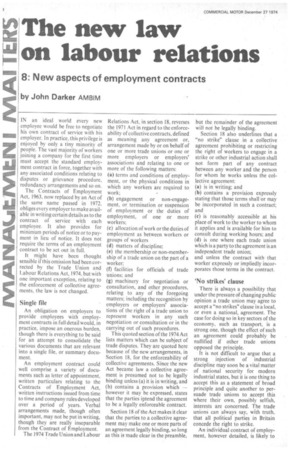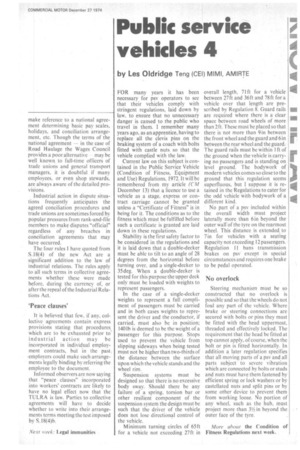The new law on labour relations
Page 30

Page 31

If you've noticed an error in this article please click here to report it so we can fix it.
8: New aspects of employment contracts by John Darker AMBIM IN an ideal world every new employee would be free to negotiate his own contract of service with his employer. In practice, this privilege is enjoyed by only a tiny minority of people. The vast majority of workers joining a company for the first time must accept the standard employment contract in force, together with any associated conditions relating to disputes or grievance procedure, redundancy arrangements and so on.
The Contracts of Employment Act, 1963, now replaced by an Act of the same name passed in 1972, obliges every employer to make available in writing certain details as to the contract of service with each employee. It also provides for minimum periods of notice or to payment in lieu of notice. It does not require the terms of an employment contract to be set out in full.
It might have been thought sensible if this omission had been corrected by the Trade Union and Labour Relations Act, 1974, but with one important exception, relating to the enforcement of collective agreements, the law is not changed.
Single file
An obligation on employers to provide employees with employment contracts in full detail would, in practice, impose an onerous burden, though there is everything to be said for an attempt to consolidate the various documents that are relevant into a single file, or summary document.
An employment contract could well comprise a variety of documents such as letter of appointment, written particulars relating to the Contracts of Employment Act, written instructions issued from time to time and company rules developed over a period of years. Verbal arrangements made, though often important, may not be put in writing, though they are really inseparable from the Contract of Employment.
The 1974 Trade Union and Labour Relations Act, in section 18, reverses the 1971 Act in regard to the enforceability of collective contracts, defined as meaning any agreement or, arrangement made by or on behalf of one or more trade unions or one or more employers or employers' associations and relating to one or more of the following matters: (a) terms and conditions of employment, or the physical conditions in which any workers are required to work; (b) engagement or non-engagement, or termination or suspension of employment or the duties of employment, of one or more workers; (c) allocation of work or the duties of employment as between workers or groups of workers (d) matters of discipline; (e) the membership or non-membership of a trade union on the part of a worker; (f) facilities for officials of trade unions; and (g) machinery for negotiation or consultation, and other procedures, relating to any of the foregoing matters; including the recognition by employers or employers' associations of the right of a trade union to represent workers in any such negotiation or consultation or in the carrying out of such procedures.
This quoted section of the 1974 Act lists matters which can be subject of trade disputes. They are quoted here because of the new arrangements, in Section 18, for the enforceability of collective agreements. Since the new Act became law a collective agreement is presumed not to be legally binding unless (a) it is in writing, and (b) contains a provision which — however it may be expressed, states that the parties iptend the agreement to be a legally enforceable contract.
Section 18 of the Act makes it clear that the parties to a collective agreement may make one or more parts of an agreement legally binding, so long as this is made clear in the preamble, but the remainder of the agreement will not be legally binding.
Section 18 also underlines that a "no strike" clause in a collective agreement prohibiting or restricting the right of workers to engage in a strike or other industrial action shall not form part of any contract between any worker and the person for whom he works unless the collective agreement: (a) is in writing; and (b) contains a provision expressly stating that those terms shall or may be incorporated in such a contract; and (c) is reasonably accessible at his place of work to the worker to whom it applies and is available for him to consult during working hours; and (d) is one where each trade union which is a party to the agreement is an independent trade union; and unless the contract with that worker expressly or impliedly incorporates those terms in the contract.
No strikes' clause
There is always a possibility that under the pressure of changing public opinion a trade union may agree to accept a "no strikes" clause in a local, or even a national, agreement. The case for doing so in key sectors of the economy, such as transport, is a strong one, though the effect of such an agreement could probably be nullified if other trade unions opposed the principle.
It is not difficult to argue that a strong injection of industrial discipline may soon be a vital matter of national security for modern industrial states, but it is one thing to accept this as a statement of broad principle and quite another to persuade trade unions to accept this where their own, possibly selfish, interests are concerned. The trade unions can always say, with truth, that all political parties in Britain concede the right to strike.
An individual contract of employment, however detailed, is likely to make reference to a national agreement determining basic pay scales, holidays, and conciliation arrangement, etc. Though the terms of the national agreement — in the case of Road Haulage the Wages Council provides a poor alternative may be well known, to full-time officers of trade unions and general transport managers, it is doubtful if many employees, or even shop stewards, are always aware of the detailed provisions.
Industrial action in dispute situations frequently anticipates the agreed conciliation procedures and trade unions are sometimes forced by popular pressures from rank-and-file members to make disputes "official" regardless of any breaches in conciliation agreements that may have occurred.
The four rules I have quoted from S.18(4) of the new Act are a significant addition to the law of industrial relations. The rules apply to all such terms in collective agreements whether these were made before, during the currency of, or after the repeal of the Industrial Relations Act.
'Peace clauses'
it is believed that few, if any, collective agreements contain express provisions stating that procedures which are to be exhausted prior to industrial action may be incorporated in individual employment contracts, but in the past
• employers could make such arrangements legally binding by referring the employee to the document.
Informed observers are now saying that "peace clauses" incorporated into workers' contracts are likely to have no legal effect now that the TULRA is law. Parties to collective agreements will have to decide whether to write into their arrangements terms meeting the test imposed by S.18(4)b.
Next seek: Legal immunities




































































